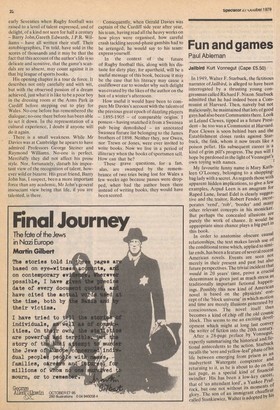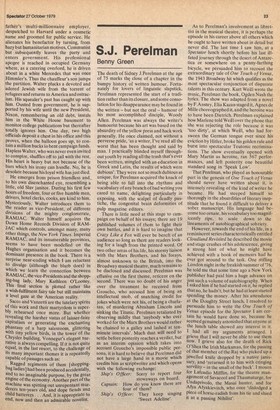Fun and games
Paul Ableman
Jailbird Kurt Vonnegut (Cape £530) In 1949, Walter F. Starbuck, the fictitious narrator. of Jailbird, is alleged to have been interrogated by a thrusting young congressman called Richard F. Nixon. Starbuck admitted that he had indeed been a Communist at Harvard. Then, naively but not maliciously, he maintained that lots of good guys had also been Communists there. Look at Leland Clewes, tipped as a future President — he too was a Communist at Harvard. Poor Clewes is soon behind bars and the Establishment closes ranks against Starbuck, the fink, whom it now treats like a poison pellet. His subsequent career is a kind of grim pill's progress. The pun will I hope be pardoned in the light of Vonnegut's own toying with names.
My favourite funny name is Mary Kathleen O'Looney, belonging to a shopping bag lady with a secret. As regards those with apparent hidden implications, to give a few examples, Arpad Leen is an anagram for Raped Lane, Israel Edel is clearly suggestive and the traitor, Robert Fender, incorporates 'rend', •'rob', 'border' and rnanY other relevant concepts in his monicker. But perhaps the concealed allusions are purely the work of chance. It would be appropriate since chance plays a big part in this book. In order to anatomise obscure causal relationships, the text makes lavish use Of the conditional tense which, applied to similar ends, has been a feature of several recent American novels. Events are seen not merely in their present and past but also future perspectives. The trivial incident that would in 20 years' time, prove a crucial determinant is given just as much stress as traditionally important fictional happenings. Possibly this new kind of American novel is based on the physicists' concept of the 'block universe' in which motion and time are merely illusions generated by consciousness. The novel itself thus becomes a kind of chip off the old cosmic block. This seems to me an exciting development which might at long last convey the writer of fiction into the 20th century. After a 28-page preface by Vonnegut, expertly summarising the historical and fictional antecedents to the action, Starbuck recalls the 'sere and yellow-leaf' phase of his life between emerging from prison as an. inadvertent Watergate conspirator and returning to it, as he is about to do on the last page, as a special kind of financial swindler. His has been a low-key career, that of 'an attendant lord', a Yankee Pruf-. rock, but one not without its momeuntsetoof glory. The son of an immigrant chaa called Stankiewicz, Walter is adopted by his father's multi-millionnaire employer, despatched to Harvard under a cosmetic name and groomed for public service. He alienates his benefactor by turning, from hazy but humanitarian motives, Communist but subsequently leaves the party and enters government. His professional apogee is reached in occupied Germany where, as a catering overlord, he is driven about in a white Mercedes that was once Himmler's. Thus the chauffeur's son jumps the partition. Walter plucks a devoted and adored Jewish wife from the torrent of refugees and returns to America and ostracism. His squealer's past has caught up with him. Ousted from government, he is supported by his wife until the new President, Nixon, remembering an old debt, instals him in the White House basement to monitor college publications but thereafter totally ignores him. One day, two high officials deposit a chest in his office and this proves, when the balloon goes up, to contain a million bucks in bent campaign funds. Hapless Walter, who was never even invited to conspire, shuffles off to jail with the rest. His heart is heavy but not because of the bars which his irony can handle. No, he is desolate because his loyal wife has just died.
He emerges from prison friendless and,_ to his own disenchanted eye, resembling a little, old Slav janitor. During his first few hours of freedom, four or five humble men, drivers, hotel clerks, cooks, are kind to him. Mysteriously, Walter introduces them to the reader as vice-President, of different divisions of the mighty conglomerate, RAMJAC. Walter himself acquires the Down Home Records Division of RAMJAC which controls, amongst many, many other things, the New York Times. Imperial RAMJAC, and its innumerable provinces, seems to have been modelled on the Hughes organisation and it becomes the dominant presence in the book. There is a surprise near-ending which I am reluctant to divulge (although the blurb does) in Which we learn the connection between RAMJAC, the vice-Presidents and the shopping-bag lady, Mary Kathleen O'Looney. This final section is plotted rather like a wish-fulfilment fairy tale but still maintains a level gaze at the American reality.
Sacco and Vanzetti are the tutelary spirits of this work and their martyrdom is superbly, rehearsed once more. But whether revealing the harsher vistas of laisser-faire capitalism or generating the enchanting phantasy of a harp salesroom, glittering With tiny yellow birds, in the tower of the Chrysler building, Vonnegut's elegant narrative is always compelling. If it is not quite equal, in the last resort, to the challenge of its many important themes it is repeatedly capable of passages such as: Ragged regiments of them [shopping bag ladies I had been produced accidentally, and to no imaginable purpose, by the great engine of the economy. Another part of the machine was spitting out unrepentant murderers ten-years old, and dope fiends and child batterers . And, it is appropriate to end, now and then an admirable novelist.



































 Previous page
Previous page